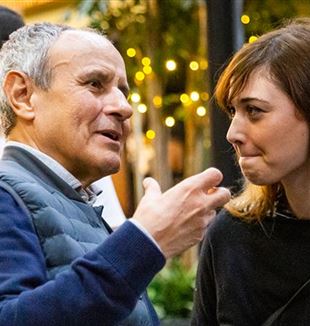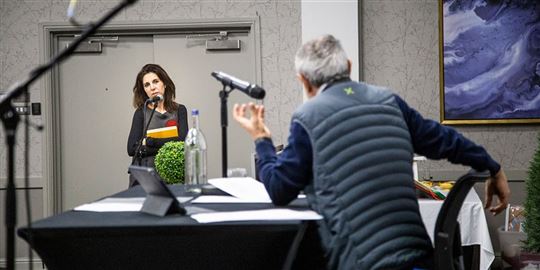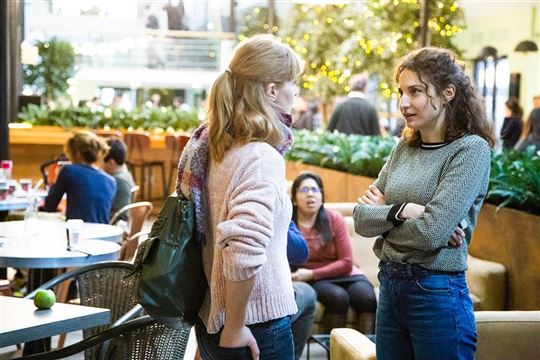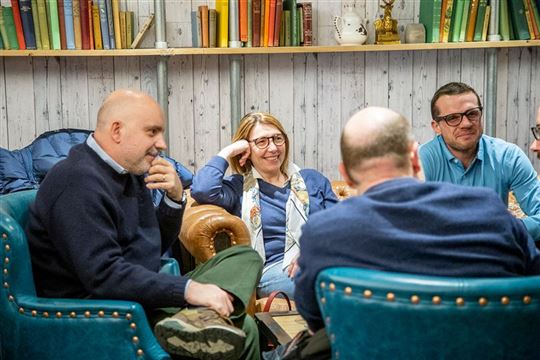
Northern European Assembly: The Surprise of Discovering That We Are Witnesses
The communities of Northern Europe gathered in Reading, west of London, for a weekend with Julián Carrón. They spoke about work, family, the drama of death. It helped everyone face the challenges that do not spare anyone in our society.“What sustains our life in the dramatic social and work environment where we find ourselves? What is our contribution to this world?” These questions opened the assembly with Julián Carrón during a weekend with the communities of Northern Europe in Reading, a few kilometers west of London. There were 400 people, many of them families with children, and they came from Great Britain, Ireland, Holland, Sweden, Norway, Malta and Luxembourg. The climate was relaxed at the end of Christmas vacation on Epiphany weekend. The next day, everyone would go back to their everyday life, that social and work environment that does not spare anyone. Many of those present were Italian “ex-pats”: those who work for multi-national companies, researchers in various universities, mothers who are raising their small children without the help of grandparents. At times, the difficulties seem insurmountable. They find themselves having to face problems, even cultural problems, that were unimaginable even ten years ago, and for which no one has a ready answer. And yet, hearing the contributions of those who have come here, it is clear that many have accepted this adventure with enthusiasm and curiosity.
Maria is pursuing a PhD in a research center at the University of Southampton. She speaks about the few days of vacation she had with a couple of students after a conference in Brazil. One of them starting drinking beer and caipirinha already at ten in the morning. He was always drunk. Maria, after being annoyed at first, remembered that, a few months earlier, this same person had told her how his family was a mess and how difficult his childhood had been. An odd tenderness began to replace her annoyance. One morning, on a beautiful beach, this friend lit up a huge joint. “Are you sure that you need that?”, Maria asked him. And he challenged her back: “Maria, I think you are too scared of life.” And she responded: “No, that’s not true.” He looked at her for a moment and added: “That’s true. From the way you work, I can tell that you are not scared of life.” She said: “Do what you want, but do what makes you happy! I am sorry if you feel judged by the way I look at you sometimes. But do what makes you happy. That’s the same desire I have for me life.”
The day after, this young man came up to Maria and told her that he had written a poem about their friendship. He read it to her. It spoke about the difficulty of his life, and the desperate way of trying to find something that would save him. The last verse said: “Italian Sun, help me to scatter my darkness.” Maria shared: “This really moved me, because for months I had been struggling to bear with myself: who I am, what I am doing…”
“You needed a drunk guy to make you see what you are able to be for the world!”, Carrón commented. And Maria responded: “What I thought was useful for the world—scolding someone for not doing the right thing—in reality was completely useless…” Carrón went on: “We think that our contribution consists in something we do. But that is not the case. The challenge is to be ourselves in the world, not closed in our shell. Because there, in the world, the Mystery sends us someone to remind us what He has done in our life. It seems like nothing, but instead… What did this guy see in Maria’s life? Why did he call her “Italian Sun”? He saw that she was not afraid of circumstances! This is not a feeling, but rather a judgment. It is the judgment from which our journey can begin.”
During the Friday evening introduction, Carrón had insisted on recognizing the Grace of our encounter with Christ: “We don’t have to do anything to be chosen. Yet we often take this preference for granted. It is necessary that, within the confusion of our time, where everyone feels lost, we recognize the gift that being here today is for us. It means that, in some way, the difficult circumstances have not won: this embrace has conquered our awareness.” And he continued: “Look at Abraham, Moses or Peter. They were chosen. But none of the difficulties that marked Mesopotamian, Egyptian or Roman society could stop the initiative of the Mystery toward those three men. And the same thing is happening to us today.”
Francesca lives in Durham, in north-east England. She shared how in the last few year, two mothers, when they found out that she was having her third child, made fun of her: “You are crazy! You always say how you want to work and yet you’re having another child. You can’t even get drunk to laugh about it…” In September, when they came back from vacation, she learned that both of them were expecting a baby. “Both of them, on different occasions, told me that I had something to do with it: seeing me with a smile and full of joy when I brought my children to school made them change their minds… I understand that this joy is born from the ‘yes’ that I try to say to Christ. I see that this is the contribution that I can give to those around me. But I have to keep saying that ‘yes’ every day.”
“Isn’t this a little too intimate?”, Carrón says with a touch of irony: “There are two way of living our belonging to the movement: one that introduces us to reality, the other that tries to avoid the relationship with reality. So we see that, in front of the same challenges of life, one person always complains and the other is always joyful and free. What, then, is the movement? It is you and I in front of circumstances. And the question is: are we moving or standing still? Because we are called to walk a path, a human path.”
In the next room, a group of babysitters was playing with the children while their parents listened to the assembly. For the mothers with smaller children, there was a speaker that allowed them to listen in the hallway. The setup was as “family friendly” as possible.
Maria, from Cambridge, recalled how she and her friend Irene went to visit a family in Tromsø, Norway, whom they had met last year. “What moved me, more than the beauty of the countryside or the aurora borealis, was seeing Christianity happen again in front of my eyes. First of all because, despite the fact that we had seen each other so little, they made us feel like a part of their family. Then, one evening we began to sing some Christmas songs, in Italian and English, and they kept asking us to sing more, until the mother of the family started playing and singing some traditional Norwegian songs for us. The next day, we stayed together, and the father even forgot to turn on the TV to watch the soccer game that he said he’d never miss for the world.” She shared how, before returning to Cambridge, the couple told them: “You have reawakened something good in us.” And the husband added: “I have looked for friends like you my whole life. Now I have found you.”
“What does this have to do with Christmas?”, Carrón asks, seemingly changing the topic: “If we do not become aware of the tenderness that has been given to us, we cannot treat others with tenderness, even if we defend Christian values. What is your contribution to those Norwegian friends? You have reawakened their humanity. But this did not happen because you were well-versed in Christian discourse and you observe the rules of the Catechism. You were aware of the fact that you are generated by the presence of Christ. Otherwise, if it were only a discourse, the Mystery would not have needed to become man. He would have been able to send a letter. The point is: How can the greatness of our I be reawakened? Through an encounter. There is no other method than running into someone. It has been like this from the time of John and Andrew.”
A few friends from Stockholm also came to Reading. They were: Sara, a clarinetist in orchestra of a local opera, Alessio, who works at Google, Anna, doing her doctorate in Mathematics, and Giovanni, a computer scientist. There was also Jorge, who works at the Spanish embassy in Oslo and who does School of Community by Skype with the people in Sweden. They were talking in the hall and seemed happy. “Are the Swedish as closed as people say?” Sara laughs: “At the beginning yes, but if they open up they are incredible.”
Laurens, from ‘s-Hertogenbosch, Holland, has opened a primary school together with a few friends. The school was born from the desire that the beauty of their friendship in the movement which they lived in the parish might become something for everyone. It is an adventure that has just begun, but that has already been recognized by the state.
Claudia from Dublin spoke about the path that began after the experience of the death of her parents, her father-in-law, and her brother-in-law. “In those years, I had to recognize how I had changed. It was as if the filter between me and what was in front of me had fallen down. In front of the death of these peoples, the question about the meaning of life was reawakened in me. I began to ask myself if Christ truly answered me. If He really can sustain my days.”
She shared how, little by little, daily life was transformed into a dialogue with Christ: “I began to recognize the signs of His presence, to see that He accompanied me, without taking away my pain, but making that pain livable because of a hope.” She explained how, soon after the death of her mother, she needed a period “of silence, to be with Him.” She didn’t go to any meetings, but only spent time with her closest friends. “I couldn’t handle anything that was not profoundly true. No false smiles. No good but empty words. When I began to return to the meetings of the community, I carried with me this desire for authenticity. And I discovered that what keeps me alive is Grace, working through the sacraments—I started going to Mass more often—and through the companionship of true friends. Now I see that, within the circumstances, I feel more free. The uncertainties of the future no longer frighten me.”
“Free, finally free!”, exclaimed Carrón: “This is the result of the path we have proposed for ourselves. Otherwise why should it interest us? Christianity is this type of experience.” What we think of as an obstacle, something to avoid, in reality is the key to understanding. He explained: “Then we begin a relationship with Christ that becomes a dialogue. Who else can live at this level of urgency? When we hear a testimony like Claudia’s, we understand what kind of reduction we often make out of what we have received. Father Giussani taught us that ‘reality reveals itself in experience’, not in an explanation. But for us reality is often unintelligible. We think that the point is to possess the right formula. Therefore, if we do not accept this journey, we may even memorize all of Giussani’s books, but we will never understand anything. Because it would go against the method that he himself taught us in the first chapter of The Religious Sense. Christian experience has to pass through our own experience. ‘Who are You who make it possible to live without fear?’ Words cannot conquer our fear. We cannot be useful for this world if our life does not truly interest us. We all have the instruments needed to walk this path; this is the grace of having encountered Giussani. But we need to use those instruments in the world for which he gave them to us.”
The gathering closed with the Mass for the Feast of Epiphany. In the homily, Carrón underlined a phrase from the prophet Isaiah: “Rise up in splendor, Jerusalem! Your light has come.” The light, he said, comes from this Child, and “we are like the moon, which receives this light and reflects it. If we welcome the light, poor as we are, He makes us witnesses. So that even the pagans, the Magi, can come to recognize it.”